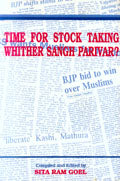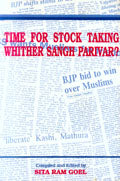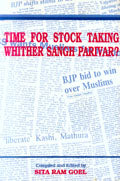Time for stock taking: whither sangh parivar?, comp. and ed. by Sita Ram Goel
Time for stock taking: whither sangh parivar?, comp. and ed. by Sita Ram Goel is backordered and will ship as soon as it is back in stock.
Couldn't load pickup availability
Genuine Products Guarantee
Genuine Products Guarantee
We guarantee 100% genuine products, and if proven otherwise, we will compensate you with 10 times the product's cost.
Delivery and Shipping
Delivery and Shipping
Products are generally ready for dispatch within 1 day and typically reach you in 3 to 5 days.
Book Details
-
Publisher: ADITYA PRAKASHAN Indological Publishers & Booksellers
-
ISBN 13: 9788185990484
-
ISBN 10: 8185990484
-
Edition: 1997
-
Year: 1997
-
Language: English
-
Subject(s): Politics, Voice of India
About the Book
This book presents a critical study of Hindu-Muslim relations since the foundation of the Indian National Congress in 1885, exploring the ideological, political, and territorial demands made by Muslims and the concessions granted by Hindus over the years. Despite these concessions, the Muslim problem remains as acute as ever. The author, Koenraad Elst, delves into the reasons behind this ongoing issue, highlighting the aggressive stance of Muslims in contemporary politics, particularly with the rise of figures like V.P. Singh, Laloo Prasad, Mulayam Singh, and Kanshi Ram.
Elst critiques the Hindu leadership for taking Hindus for granted while negotiating with Muslims on their terms, a tendency that has persisted from the era of the Congress Party to the present-day Sangh Parivar. He further discusses the secularist theory, which suggests that the Hindu-Muslim conflict was a British invention, and examines how this narrative continues to influence Indian politics. The author also addresses the failure of the Sangh Parivar to offer a substantive analysis of Islam's intrinsic hostility to idolatry and its implications for Hindu-Muslim relations.





